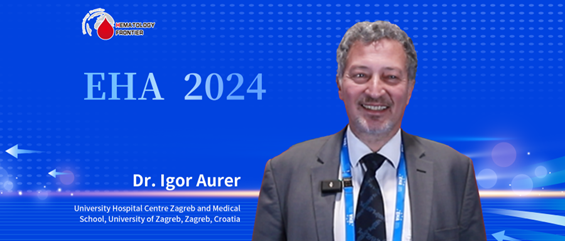MediaMedic posted on LinkedIn:
“Patients with AIDS have a significantly higher risk of developing non-Hodgkin lymphoma (NHL) compared to the general population. To promote a deeper understanding and standardized treatment of AIDS-related lymphoma (ARL), a special session titled ‘ARL: EHA-ESMO Clinical Practice Guidelines’ was held at the recent 29th Annual Meeting of the European Hematology Association (EHA 2024).
Oncology Frontier – Hematology Frontier interviewed the session chair, Dr. Igor Aurer from the University Hospital Centre Zagreb and Medical School, University of Zagreb, Zagreb, Croatia. He discussed the pathogenesis of ARL, treatment challenges, key updates to the guidelines, practical clinical advice, and his outlook for next year’s EHA meeting and advancements in hematology.
Oncology Frontier – Hematology Frontier: Given your extensive experience in the field of hematology, can you explain why HIV-infected patients are more prone to developing lymphoma compared to other healthy individuals?
Dr. Igor Aurer: HIV patients, as well as other immunocompromised individuals, are more frequently affected by lymphoma due to their impaired immune systems. In such cases, they cannot effectively control chronic viral infections like Epstein-Barr virus (EBV) or cytomegalovirus (CMV), which significantly increases the risk. Additionally, in HIV patients, the virus directly integrates into the lymphocyte genome, further promoting lymphoma development.
Oncology Frontier – Hematology Frontier: At this year’s EHA meeting, the clinical practice guidelines for HIV-related lymphoma were notably updated. Could you elaborate on these updates and their significance?
Dr. Igor Aurer: About two years ago, we initiated a project to update the treatment recommendations for HIV-related lymphoma. These updates are crucial as they reflect the latest advancements and research in the field, particularly improvements in patient treatment response and tolerability. Since the introduction of highly active antiretroviral therapy (HAART), the treatment landscape for HIV-related lymphoma has significantly changed, making the treatment approaches for HIV-positive patients increasingly similar to those for immunocompetent patients. However, customized treatment guidelines are still necessary for patients with severe immunosuppression.
Oncology Frontier – Hematology Frontier: What factors need to be considered when treating HIV-related lymphoma?
Dr. Igor Aurer: One of the main considerations is the interaction between drugs used for viral treatment, infection prevention, and lymphoma treatment. It is crucial to continue using antiretroviral drugs during lymphoma treatment, as stopping them could have severe consequences. Additionally, HIV-positive patients may have unique disease entities not present in immunocompetent individuals. Therefore, specific treatment guidelines are necessary to ensure effective management.
Oncology Frontier – Hematology Frontier: This conference also featured clinical case presentations and panel discussions. Could you share some cases with us?
Dr. Igor Aurer: One particularly interesting case involved a newly diagnosed HIV patient with concurrent secondary infections like tuberculosis and lymphoma. This patient was severely immunosuppressed, and managing all these conditions was highly challenging. However, both lymphoma treatment and HIV management showed positive outcomes. This case underscores the importance of having comprehensive guidelines and a multidisciplinary treatment approach.
Oncology Frontier – Hematology Frontier: Looking forward to next year’s EHA meeting in Milan, what advancements in hematology do you anticipate?
Dr. Igor Aurer: The EHA meeting serves as a valuable platform for global experts to share the latest research findings and advancements in the field of hematology. Looking ahead to the 2025 EHA meeting, I anticipate continued progress in targeted therapies and personalized medicine. These advancements will undoubtedly bring new hope and better treatments for patients. We look forward to another exciting and productive meeting.”
Source: MediaMedic/LinkedIn


